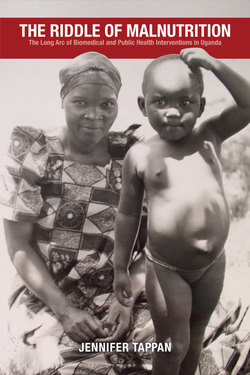The Riddle of Malnutrition

Реклама. ООО «ЛитРес», ИНН: 7719571260.
Оглавление
Jennifer Tappan. The Riddle of Malnutrition
Отрывок из книги
THE RIDDLE OF MALNUTRITION
Series editor: James L. A. Webb, Jr.
.....
Across the continent, the 1940s were a period of heightened political dissent and labor activism. In Uganda, workers calling for higher wages and crop prices organized a general labor strike in 1945, and in both the labor strike and the political insurrection that followed, political activists sent a clear message that the increasing economic constraints of the postwar period represented a failure of political leadership.68 Despite distinct visions of how best to achieve a more just and equitable society, activists shared a strong objection to the unethical abuse of power for personal gain in colonial Uganda. The landed oligarchy of Ganda chiefs and Indian middlemen became obvious targets of unrest, as postwar inflation created great hardship for ordinary Ganda and intensified longstanding accusations of profiteering on the part of the Indian middlemen.69 The worsening economic situation exposed the practice of indirect rule in Buganda as an inherently autocratic and oppressive system. The inaction of Ganda chiefs and officials in the face of economic and political threats to general welfare and wellbeing indicated that their alliances were with the British rather than with the people, making them targets of the insurrection.70 When the delegates met with the kabaka in 1949, they sought to critique this enduring alliance between the British and the landed chiefly class, and they notably couched their grievances in references to hunger and starvation.71 One representative told the kabaka, “people are undernourished, they eat bad food because they have no money.” Another claimed that “the people outside there are in agony. . . . The growers are dying from hunger.”72
Many of the grievances that fueled unrest in this period coalesced in the figure of the elite Ganda doctor and aspiring politician, Eria Muwazi. After graduating from Makerere in 1934 with the prestigious Owen Medal, Muwazi became the senior African medical officer and “medical tutor” or “African Registrar” at Mulago, making him an especially prominent member of the medical profession in Uganda. “By the later 1940s,” the historian John Iliffe notes, “medical graduates had become the elite of the elite. . . . They were professional men . . . with growing families and many social contacts. They were invited to tea at Government House [and] became the first African members of official boards.”73 For Muwazi this was especially true. As the central figure in the formation of the Makerere Medical Graduates Association, Muwazi led the struggle for official recognition of their professional status. He was the first East African to publish in a scientific journal, later became a high-ranking politician closely connected to the kabaka, and was named the third most important figure in the parish in a 1955 survey of a Kampala suburb.74 Moreover, Muwazi remained a prominent member of the ruling elite and became involved in the controversies that sparked political crisis in the postcolonial period.75
.....